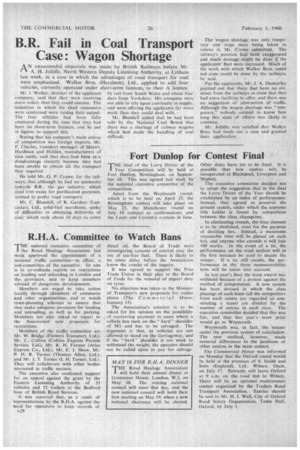R.H.A. Committee to Watch Bans
Page 74

If you've noticed an error in this article please click here to report it so we can fix it.
"THE national executive committee of
the Road Haulage Association last week approved the appointment of a national traffic committee—in effect, a sub-committee of the executive. Its aim is to co-ordinate reports on restrictions on loading and unloading in London and the provinces, and to keep members advised of dangerous developments.
Members are urged to take action locally through chambers of commerce and other organizations, and to watch town-planning schemes to ensure that they make adequate provision for loading and unloading, as well as for parking. Members are also asked to report to the Association new proposals for restrictions.
Members of the traffic committee are Mr. W. Bridge (Flowers Transport, Ltd.), Mr. C. Collins (Collins Express Parcels Service. Ltd.), Mr. R. H. Farmer (Atlas Express Co., Ltd.), Mr. E. J. Shaw, Mr. P. H. R. Turner (Thomas Allen, Ltd.),, and Mr. J. T. Turner (J. H. Turner, Ltd.). They will collaborate -with other bodies interested in traffic matters.
The executive also confirmed support for an appeal against the grant by the Eastern Licensing Authority of 33 vehicles and 12 trailers at the Bedford base of British Road Services.
It was reported that, as a result of representations by the R.H.A. against the need for operators to keep records of r28 diesel oil, the Board of Trade were investigating systems of control over the use of tax-free fuel. There is likely to be some delay before the Association know the results of the inquiry.
It was agreed to support the Free Trade Union in their plea to the Board of Trade for the removal of import duly on tyres.
No objection was taken to the Minister of Transport's new proposals for trailer plates (The Co m in e r cia I Motor, January 15).
The Association's solicitor is to be asked for his opinion on the possibility of recovering payment in cases where a vehicle has sunk on the " hard " shoulder of MI and has to be salvaged. The argument is that, as vehicles are not allowed to stand on the carriageway, and if the " hard " shoulder is too weak to withstand the weight, the operator should not be called upon to pay for salvage.




























































































































